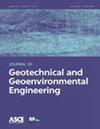Isothermal Dual-Phase Flow Modeling to Assess the Impact of Gas Collection on Geotechnical and Hydraulic Performance of Landfills
IF 4.4
2区 工程技术
Q1 ENGINEERING, GEOLOGICAL
Journal of Geotechnical and Geoenvironmental Engineering
Pub Date : 2023-08-01
DOI:10.1061/jggefk.gteng-11260
引用次数: 0
Abstract
Liquid addition to landfilled municipal solid waste (MSW) is a practice employed to accelerate the biodegradation of the organic fraction of MSW and ensuing gas generation. Pore landfill gas (LFG) and leachate pressure from the added moisture and enhanced gas generation are expected to impact the geotechnical stability of landfill slopes. The impact of moisture addition and gas collection on the stability of landfills was numerically modeled using transient isothermal dual-phase flow and slope stability modeling. The temporal variation in the factor of safety (FS) for slope stability analysis was estimated for the simultaneous flow of LFG and leachate with and without gas collection and leachate recirculation for varying LFG generation rates and waste moisture contents. A significant decline in the FS for landfill slope stability was observed when recirculating leachate without active gas collection. Even without pressurized leachate recirculation, a significant decline in the FS value was observed for landfills with relatively high in situ moisture content without active gas collection. In some modeled scenarios without LFG collection, the FS value was lower than 1. The analysis suggests that the landfill side slope stability analysis should incorporate LFG generation and the resultant pressure for landfills containing high-moisture-content waste and for the landfill with pressurized leachate recirculation. The analysis suggests that an efficient gas collection system plays a critical role in the geotechnical stability of the slope of wet landfills and the performance of leachate recirculation trenches.等温双相流模型评估气体收集对垃圾填埋场岩土和水力性能的影响
在填埋的城市固体废物(MSW)中添加液体是一种加速城市固体废物有机部分生物降解和随后产生气体的做法。孔隙填埋气(LFG)和渗滤液压力由增加的水分和增强的气体生成预计将影响填埋场边坡的岩土稳定性。采用瞬态等温双相流和边坡稳定性模型,对加湿和气集对填埋场稳定性的影响进行了数值模拟。在不同的LFG生成率和废物含水率下,估算了有和没有气体收集和渗滤液再循环的LFG和渗滤液同时流动时边坡稳定性分析的安全系数(FS)的时间变化。在没有主动气体收集的情况下循环渗滤液,观察到填埋场边坡稳定性的FS显著下降。即使没有加压渗滤液再循环,在没有主动气体收集的情况下,相对较高的原位含水率的垃圾填埋场,FS值也会显著下降。在一些不收集LFG的建模场景中,FS值小于1。分析认为,高含水率垃圾填埋场和渗滤液加压回灌垃圾填埋场的边坡稳定性分析应考虑LFG的产生及其产生的压力。分析表明,高效的集气系统对湿式填埋场边坡的岩土稳定性和渗滤液回灌沟的性能起着至关重要的作用。
本文章由计算机程序翻译,如有差异,请以英文原文为准。
求助全文
约1分钟内获得全文
求助全文
来源期刊
CiteScore
7.50
自引率
7.70%
发文量
222
审稿时长
12 months
期刊介绍:
The Journal of Geotechnical and Geoenvironmental Engineering covers the broad area of practice known as geotechnical engineering. Papers are welcomed on topics such as foundations, retaining structures, soil dynamics, engineering behavior of soil and rock, site characterization, slope stability, dams, rock engineering, earthquake engineering, environmental geotechnics, geosynthetics, computer modeling, groundwater monitoring and restoration, and coastal and geotechnical ocean engineering. Authors are also encouraged to submit papers on new and emerging topics within the general discipline of geotechnical engineering. Theoretical papers are welcomed, but there should be a clear and significant potential for practical application of the theory. Practice-oriented papers and case studies are particularly welcomed and encouraged.

 求助内容:
求助内容: 应助结果提醒方式:
应助结果提醒方式:


